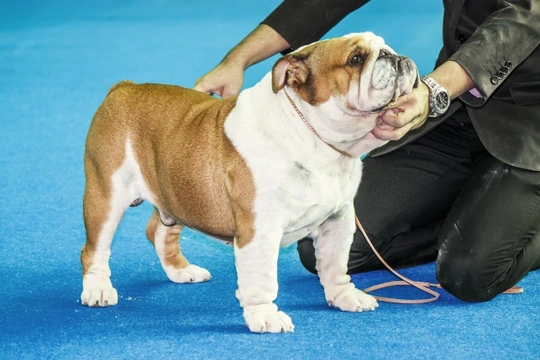Pets
Pets for studWanted petsBreedersAccessories & services
Knowledge hub
Support
Support & safety portal
Hyperuricosuria (HUU) in dogs
Hyperuricosuria or HUU for short is a hereditary canine health condition that causes the uric acid concentration in the dog’s urine to be abnormally high, which raises the chances of affected dogs developing kidney and bladder stones, as well as cystitis.
The condition occurs because of a gene mutation, which in turn results in uric acid being ineffectively transported between the liver and renal organs.
Kidney and bladder stones can be very painful for dogs, and often, are too large to be passed out through the body naturally, which means that they may require surgical removal. The condition can be controlled to some extent by feeding a prescription diet designed to reduce the acidity of the urine, but it can be problematic for the life of the dog, as well as potentially expensive to treat if surgery is required.
The condition is not contagious, and is a hereditary condition, which means that the only way for a dog to develop the condition is by means of inheriting the right combination of mutated genes from their two parents.
In order to curb the spread of the condition through the wider gene pool of affected breeds, The Kennel Club oversees a testing scheme and health results finder for the condition, which allows potential breeders of at-risk breeds to test for their own dogs’ status prior to breeding.
In this article we will look at hyperuricosuria in dogs in more detail, including what sort of dogs can be affected by it, how the heredity of the condition works, and how to get your dog tested. Read on to learn more.
More about hyperuricosuria
Hyperuricosuria’s main effect on dogs with the condition is a propensity to lead to bladder and kidney stones, which form due to the overly acidic urine, which leads to the formation of crystals that eventually form into stones.
These stones can potentially block the normal elimination pathways of the bladder and kidneys, as well as being painful to pass when the stones are large, and if particularly large stones cannot be passed normally or broken up within the body to be eliminated in the urine, will require surgical removal.
Removing stones does not mean that further stones will not form, however, and the condition is usually controlled by careful monitoring and feeding a specialist diet that is designed to balance out the overly high acidity levels of the urine and so, reduce the chances of stones forming.
What type of dogs can be affected by the condition?
Most of the UK’s registered dog breeds have presented with hereditary hyperuricosuria at some point, which theoretically means that any dog breed can be affected.
However, the breeds considered to be most at risk for the condition and so, that The Kennel Club recommends pre-breeding screening for, are the Dalmatian, American bulldog, French bulldog, English bulldog, large Munsterlander, and the Russian black terrier.
Cross breed dogs can potentially inherit the condition too if both of their parents carry the gene mutation that leads to the condition, and while it is less likely for a cross breed to develop hyperuricosuria than a pedigree dog due to the benefits of hybrid vigour, because the condition has been identified in such a large number of breeds, it is still something to bear in mind.
How does the heredity of the condition work?
Hyperuricosuria is inherited by means of autosomal recessive heredity, which means that just because one parent dog has the condition or is a carrier for it, their puppies will not necessary be affected too-the combination of genes inherited from both parent dogs dictates the status of the puppies. Dogs can be either clear, carrier or affected, with carriers not suffering from the condition themselves but still able to pass on the gene mutation to their offspring.
- Two clear dogs will produce clear puppies.
- Two affected dogs will produce affected puppies.
- Two carriers will produce a mixture of 50% carriers, 25% clear and 25% affected.
- A clear dog and a carrier will produce 50% clear and 50% carriers.
- A clear dog and an affected dog will produce a litter of carriers.
- A carrier and an affected dog will produce 50% carriers and 50% affected.
How to get your dog tested
The Kennel Club keeps a list of UK laboratories that are approved to test dogs for hyperuricosuria, and in order to get your dog tested you simply need to ask your vet to take a DNA sample from your dog (in the form of a blood sample or cheek swab) which is then sent off to the laboratory, who will return the result of the dog’s status to the owner, as well as The Kennel Club for recording.
Finding out the dog’s status and so, the results that will be present in their puppies if the dog is mated with another tested dog is important, as this allows breeders to ensure that they do not breed further litters that will be affected by the condition.



